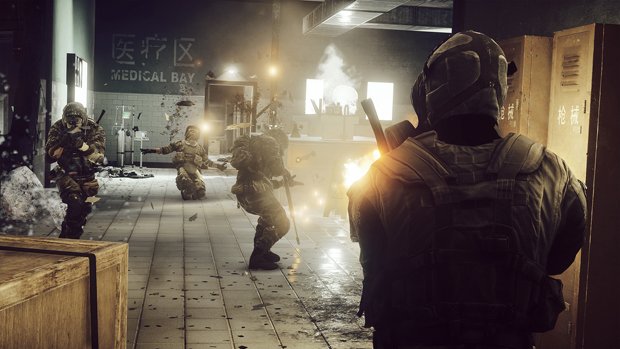EA is getting sued for Battlefield 4 - but is there really a case to answer?
So, it looks like San Diego law firm Robbins Geller Rudman & Dowd LLP has commenced a lawsuit against EA related to alleged misleading claims about Battlefield 4. It comes after several senior members at the company sold shares during July and August, following an increase in EA’s market-value; an increase that happened on the back of bullish sales predictions for Battlefield 4 and EA's other late 2013 games. It makes the following allegations against the game’s publisher, and the next paragraph is a direct copy of the suit.

(a) Battlefield 4 was riddled with bugs and multiple other problems, including downloadable content that allowed players access to more levels of the game, a myriad of connectivity issues, server limitations, lost data and repeated sudden crashes, among other things; (b) as a result, Electronic Arts would not achieve a successful holiday season 2013 rollout of Battlefield 4; (c) the performance of the Electronic Arts unit publishing Battlefield 4 was so deficient that all other projects that unit was involved in had to be put on hold to permit it to focus its efforts on fixing Battlefield 4; and (d) as a result, Electronic Arts was not on track to achieve the financial results it had told the market it was on track to achieve during the Class Period.
Put simply, Robbins Geller Rudman & Dowd are saying that EA knew Battlefield 4 would be full of bugs when it released, but that EA lied about how successful the game might be, and several members of the company used this alleged lie to sell their shares at an inflated price. That’s what it boils down to. It’s worth noting that there’s no plaintiff at the moment--no-one who is claiming to have been financially harmed by the game’s alleged under-performance--and that Robbins etc has 60 days to find one before the class-action lawsuit can be filed.

So what does it all mean? Firstly, no-one is saying that Battlefield 4 works perfectly. Yes, it has bugs--I’ve encountered crashes and lag myself, and I know most others have too. The real question is whether anyone at EA would have known a) about these bugs in July and August, and b) whether they thought the bugs would have negatively impacted sales. It isn’t about whether or not EA was right to release the game in November (or whether they should have waited until 2014)--it’s about whether EA misrepresented the success of the game to investors and then cashed in on that.
Could EA’s execs have known about the volume and severity of bugs and server issues in July and August? It seems unlikely. Although internal milestones give a glimpse of how the overall product is shaping up, bug fixing and post-release support are things that occur more at the tail-end of the project when there’s a clearer idea of the overall game (in other words, there’s no point bug-fixing stuff that doesn’t make the final cut, or without considering the effect that fixes will have on other, unfinished aspects of the game). Add to that the fact that DICE was working on unfinished hardware, in the case of PS4 and Xbox One, and that--even with a Beta--there’s no way to properly stress-test the effect of millions of people suddenly playing your game, and it becomes even less likely that anyone could have predicted the severity and frequency of problems.

However, given all the reasons I just listed above, EA were perhaps too confident in their sales predictions. Although it’s unlikely they could have quantified the problems of releasing such an online-focused game on new hardware (and--perhaps--the extent of the effect that would have on sales of the game on PC, and current-gen consoles), they should have been mindful that problems would occur and that this could negatively impact sales--especially given the power of ‘word of mouth’ warnings over seemingly ‘broken gaming experiences’. The question is: did EA deliberately ignore these potential issues to keep the share price high, or was it genuine underestimation on the company’s behalf?
Look, it isn’t for me to say. I know that, if Robbins etc find a plaintiff(s) and get the case to court, a judge and jury will provide the official answer. If EA did deliberately mislead investors, then it also seems likely that the executives that sold their shares did so because they were aware of the deception and wanted to make money before the share price fell. Again, though, that is pure speculation. If not, then this is just a case of people selling shares when the price is high because, hey, that’s just what you do. And anyone who bought shares at a high price, then lost money because EA’s Christmas games failed to meet expectations… well, that’s just poor business sense.
Sign up to the GamesRadar+ Newsletter
Weekly digests, tales from the communities you love, and more

What does EA say to all this? Well, I'm yet to receive official comment from EA UK, but they have previously stated that: "We believe these claims are meritless. We intend to aggressively defend ourselves, and we’re confident the court will dismiss the complaint in due course." Fair enough. EA has also restated that the fact everyone at DICE is working on bug-fixing (to address the problems as quickly as possible) will not have an impact on future projects. It will only delay the rollout of Battlefield 4 DLC, which--as I talked about a couple of weeks ago--can only be a good thing. You don’t want to release more content into an already unstable game.
Frankly, it’s all a bit of a mess. Video games are no strangers to court-cases (Hot Coffee anyone?), and I agree that in areas of genuine malpractice, publishers and developers should be held accountable. That’s what we could potentially have here. Again--this isn’t about the actual bugs, but about knowledge of what the bugs could do to EA’s share-price.

My real concern with this case is that it’ll open the legal floodgates to any butt-hurt player who loses a save-game. “Hey, I lost my progress in Man-Shooter 5: I’m going to sue, just like the guys who did Battlefield 4!” That’s not a good use of legal time and money, and for every tenuous lawsuit publishers like EA need to fight, this will only direct money away from game development and into the pockets of lawyers. Are the lawyers going to make us a new Star Wars Battlefront? I think not.



